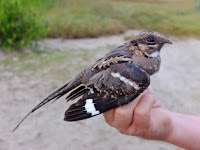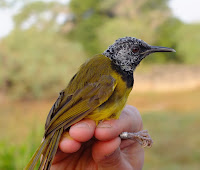Peter N writes: The
winter solstice has now passed, and we are into the new year, best
wishes for 2018 to all our readers.
Adam, our group
secretary, has now compiled the complete records for 2017, These will
eventually be presented in the annual report, but here is a brief
summary of what we have been up to. Over the year, we processed a
total of 61 species comprising 9,874 birds. Of these, 7078 were new,
640 were pulli, and 2,156 were retraps. The commonest bird was the
Blackcap (2083), but the rarest was Mick’s stonking Dusky Warbler;
a once in a life time event (probably). Just staying with the
Blackcaps, if we assume a weight of 18g per bird, that gives a figure
of 37.5 kilos total weight- that’s a lot of avian biomass, northern
Europe is clearly a productive place. I have been ringing with the
group for three years now, and even as a novice have racked up a
total of 6,112 birds, so many thanks to all who have guided and
generally put up with me over the years.
The group also likes
to travel and meet people. During the year we have had expeditions to
Cyprus, Spurn and Skokholm. Recently I had an excellent experience
ringing in Gambia for two weeks in November. I stayed at the
Lemonfish Guesthouse in Kartong, and ringed at Kartong Bird
Observatory with a group of fellow Brits. This is a fabulous place,
and if you are travelling to the Gambia for a bit of winter sun,
should be a must for anyone interested in birding. I ringed 60 new
species, which was exciting but what was even more interesting (for
me), was getting to ring a lot of waders in the flooded gardens
nearby, including a lot of the birds that spend the summer in Europe,
e.g. Common and Marsh Sandpiper, Ringed Plover and Turnstone. Not
uncommon, but difficult to gain much experience with - especially if
you live in the middle of England.
Dave is famously
reticent about mention of the birds he has ringed abroad, but here
are a couple of photos to remind me of warmer times, as we go about
our annual scrub-bashing, to get the reservoir conservation work done
in time for the return of our warblers:
 |
| Long-tailed Nightjar |
 |
| Oriole Warbler |

No comments:
Post a Comment
Note: only a member of this blog may post a comment.